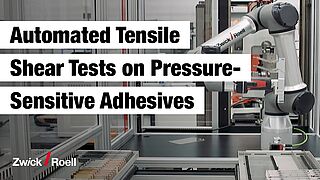Henkel AG & Co. KGaA: How Automation in the Test Lab Promotes the Pace of Product Innovation
Automated materials testing machines from ZwickRoell speed up product development and support an efficient and reliable quality control process. Based on these important benefits, Henkel AG & Co. KGaA in Düsseldorf, Germany is now focusing on automation in the adhesives sector. Since 2021, robots have been supporting laboratory tasks on three testing systems in the Henkel Adhesive Technologies – Inspiration Center Düsseldorf (ICD), consistently allowing employees more time to focus on other research and development responsibilities.
Martin Altrock, Laboratory Technician at Henkel Adhesive Technologies, is excited when talking about his work in the test lab. Part of his enthusiasm relates to the automated ZwickRoell testing machines, which since the opening of the Henkel Adhesive Technologies – Inspiration Center Düsseldorf (ICD) have been reliably running tests and supporting the young technician and his colleagues around the clock with their daily tasks at this international organization. The objective of the Henkel Adhesive Technologies – Inspiration Center Düsseldorf (ICD)—with 30 laboratories and 4 technology centers—is to perform a large quantity of material tests from a centralized location and react more quickly to trends and developments with new products. Altrock: “Every Monday, I look forward to coming into work and seeing how the automated systems ran tests on my specimens, for example, at 3 a.m. the day before. Completely autonomous and always with consistent repeatability.”
Henkel: automation processes setting standards
Henkel AG & Co. KGaA has two divisions (Henkel Consumer Brands and Henkel Adhesive Technologies). The latter develops, produces and distributes adhesives, sealants and functional coatings. Where work in the testing lab used to look different, the new automation processes have now set standards for testing since they were introduced at Henkel Adhesive Technologies – Inspiration Center Düsseldorf (ICD), helping improve efficiency in resource planning: on the one hand, a big challenge at Henkel was to perform a large number of tests and “on the other hand, to cope with the very different requirements of the research groups,” said Altrock. This situation has improved significantly.
Automation: machines take over routine tasks
Currently, three ZwickRoell systems, consisting of machine and robot, are taking on a large part of the mechanical tests and many monotonous routine tasks, without which professional research and development would not be possible: this includes tensile, shear, and in the future also peel and compression tests—some inside a temperature chamber at a range of -55 °C to +250 °C. Many different steps are integrated in the automated process: before a tensile test, the specimen cross-section is determined; during the test procedure a video is recorded; and after the test is complete, high-resolution images are taken of the fracture. In addition, the automated machines carry out interlaminar shear strength tests: here, two bonded substrates with a defined overlap area are pulled apart to test adhesion and cohesion properties. Furthermore, tensile tests are performed on test bars: pure cured adhesive is pulled apart in bone or paddle shapes to test ductility and load bearing capacity.
Inspiration Center Düsseldorf (ICD): continuous testing with consistent quality
In addition to the test performance, the recording of results has also become significantly faster, and above all easier—thanks to automation. Another advantage of automated assistants: monotonous tasks are completed continuously without pause and always with the same repeatability. This prevents errors that could occur from operator fatigue. Altrock: “Minor fluctuations in the test conditions, for example caused by temperature differences of the human hand, are also eliminated. And if an experiment is not successful it is now much easier to identify the source of the error.”
Henkel: getting products to market faster
What led Henkel to work with ZwickRoell solutions for these automation processes? Altrock: “We have been working with ZwickRoell for a long time, and it has always been a great experience. We always get the right solutions for our requirements. ZwickRoell testing machines have the equipment features we need. And those are the convincing factors for us!” By adding automation processes in the testing lab, laboratory personnel now have more time for other things: “My colleagues use the time gained to develop new formulations for our portfolio. And since the robots can be used around the clock, we can significantly increase our test volume and deliver test results within 24 hours. This ultimately allows us to introduce new products to the market at a much faster pace,” said Altrock.
More information is available here.
Copyright images: Henkel AG & Co. KGaA
